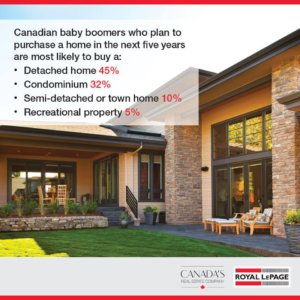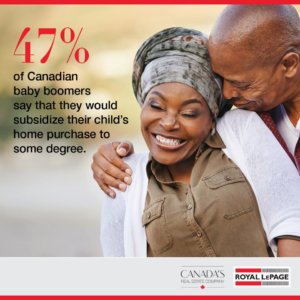Royal LePage has released it’s Boomer Property Trends Report. The release includes results from a poll conducted by Leger surveying Canadian baby boomers (currently aged 54 to 72) on real estate trends, which we believe will have a significant impact on the real estate market within the next five years.
Key highlights include:
- 17 per cent of Canadian baby boomers are planning to purchase a new home in the next five years.
- 56 per cent of boomers consider their local housing market unaffordable for retirement.
- 9 per cent of boomer parents do not expect their kids to move out until after the age of 35; this number is almost three times higher in British Columbia.
- Many boomers are willing to help their children with real estate purchases. If asked for assistance by their child, 41 per cent would give less than 25 per cent of the home’s total value, while 5 per cent would give 25 per cent of the home purchase price or higher.
- Canadian baby boomers who plan to purchase a home in the next five years are most likely to buy a detached home (45 per cent), a condominium (32 per cent), a semi-detached or town home (10 per cent) and a recreational property (5 per cent).
 The Royal LePage Boomer Trends Survey found that 17 per cent of Canadian baby boomers (born between 1946-1964) are planning to purchase a new home in the next five years. This is expected to have a meaningful impact on the housing market, as the group represents 1.4 million[1] potential buyers and sellers. The research, conducted by Leger for Royal LePage, found that more than half (59 per cent) are opting to renovate their current residence rather than buying a new home.
The Royal LePage Boomer Trends Survey found that 17 per cent of Canadian baby boomers (born between 1946-1964) are planning to purchase a new home in the next five years. This is expected to have a meaningful impact on the housing market, as the group represents 1.4 million[1] potential buyers and sellers. The research, conducted by Leger for Royal LePage, found that more than half (59 per cent) are opting to renovate their current residence rather than buying a new home.
“Don’t count them out yet – baby boomers will impact Canada’s housing market in a big way in the coming years, as another 1.4 million of this large demographic are expected to sell and buy real estate between now and 2023,” said Phil Soper, president and CEO, Royal LePage. “While the wave of older consumers will increase competition for condominium property in particular, there is no single type of home that boomers will be investing in.”
“Our research does indicate that smaller cities and recreational areas will attract more investment than major cities,” continued Soper. “This large segment of the population views our big cities as generally unaffordable for retirement purposes.”
The survey found that 44 per cent of respondents across Canada who still have children living at home expect them to move out between the ages of 21 and 25, and 21 per cent expect them to leave between the ages 26 and 30. Eighteen per cent anticipate their children will move out after the age of 30, with 9 per cent expecting them to depart after the age of 35. This percentage nearly triples in British Columbia, where 24 per cent of respondents with children living at home expect their children to move out after the age of 35. According to Royal LePage’s Peak Millennial Survey[2] conducted last year, 14 per cent of Peak Millennials surveyed are living with their parents.
“Our 2017 research into the largest group of first time home buyers in Canada, which we call the Peak Millennials, showed many were roosting in the family nest well beyond the traditional age of exit,” Soper said. “With this work, we have confirmed that boomers are allowing children to reside at home well into adulthood. Yet they won’t stay forever, and when they go, the folks are going condo shopping.”
Retirement Plans and Perceptions on Housing Affordability
 When asked about plans nearing or during retirement, one in five (20 per cent) boomers intend on buying a new property, while 71 per cent do not plan on buying a new home. Respondent sentiments were mixed on the desire to downsize, with less than half (41 per cent) stating that they would seek a smaller dwelling in retirement, while just over half (52 per cent) have no intention of downsizing.
When asked about plans nearing or during retirement, one in five (20 per cent) boomers intend on buying a new property, while 71 per cent do not plan on buying a new home. Respondent sentiments were mixed on the desire to downsize, with less than half (41 per cent) stating that they would seek a smaller dwelling in retirement, while just over half (52 per cent) have no intention of downsizing.
Considering recent home price increases in several Canadian markets, more than half (56 per cent) of boomers polled said they consider the housing market in their city or region to be unaffordable. This number jumps to 78 per cent and 63 per cent of respondents in British Columbia and Ontario, respectively. When asked about their willingness to relocate, over one-third (34 per cent) of respondents nationally stated that they are open to moving to another city or suburb where property prices are more affordable.
Financial Status and Support for Children
 Overall, a large segment of the boomer population is on strong financial footing and on a clear path to being mortgage-free, if not already. According to the survey, over three-quarters (77 per cent) of those who own a home have paid off over 50 per cent of their mortgage, and 61 per cent have paid off over 90 per cent.
Overall, a large segment of the boomer population is on strong financial footing and on a clear path to being mortgage-free, if not already. According to the survey, over three-quarters (77 per cent) of those who own a home have paid off over 50 per cent of their mortgage, and 61 per cent have paid off over 90 per cent.
Many boomers are willing to help their children with real estate purchases, with 47 per cent affirming that they would subsidize their child’s home acquisition to some degree.
“Baby boomers are the most affluent generation in Canadian history, yet the journey has not been without challenge and adversity. Through several difficult economic recessions, the equity in their homes has proven to be wealth bedrock. This is a generation that deeply values home ownership and very much wants their children to have the same opportunity,” concluded Soper.
Summaries and Trends Specific to British Columbia
 With so many boomers relying on their homes to fund their retirement, 43 per cent said they are planning to eventually downsize their principal residence and almost half (42 per cent) would consider purchasing a condominium for their next home. Thirty-seven per cent would be willing to move to a new area in search of affordability.
With so many boomers relying on their homes to fund their retirement, 43 per cent said they are planning to eventually downsize their principal residence and almost half (42 per cent) would consider purchasing a condominium for their next home. Thirty-seven per cent would be willing to move to a new area in search of affordability.
“More and more we’re seeing baby boomers in British Columbia downsizing from a detached home to a condominium,” said Michael Trites, managing broker, Royal LePage Northstar Realty. “Increasingly they are transitioning into condos to unlock some of the equity they have built up in their homes, while gaining more flexibility as their health and lifestyle preferences change.”
A vast majority (88 per cent) of boomers in B.C. believe that real estate is a good investment, and 42 per cent of respondents with children stated that they would be willing to subsidize their purchase of a home.
Home to some of the most expensive markets in the county, only 19 per cent of boomers in B.C. consider the housing market in their region affordable – the lowest rate in the county.
Click here to view the full report

